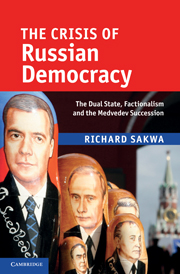Book contents
- Frontmatter
- Contents
- List of tables
- Preface
- Acknowledgements
- Note on transliteration
- 1 The dual state in Russia
- 2 Succession struggles and electoral contests
- 3 Political power and factionalism
- 4 A genuinely political economy
- 5 Managed succession
- 6 War of the Putin succession
- 7 Duma selection
- 8 Presidential succession
- 9 Medvedev's challenge
- 10 Conclusion: transcending the dual state
- Bibliography
- Index
2 - Succession struggles and electoral contests
Published online by Cambridge University Press: 05 June 2012
- Frontmatter
- Contents
- List of tables
- Preface
- Acknowledgements
- Note on transliteration
- 1 The dual state in Russia
- 2 Succession struggles and electoral contests
- 3 Political power and factionalism
- 4 A genuinely political economy
- 5 Managed succession
- 6 War of the Putin succession
- 7 Duma selection
- 8 Presidential succession
- 9 Medvedev's challenge
- 10 Conclusion: transcending the dual state
- Bibliography
- Index
Summary
Adam Przeworski defines democracy as ‘a system in which parties lose elections’ in which ‘outcomes depend on what participants do but no single force controls what occurs’. For him ‘The decisive step toward democracy is the devolution of power from a group of people to a set of rules.’ In keeping with the hybrid nature of the Russian system, the rules governing Russian elections are exhaustive, but their operation in the end does depend on a ‘single force’, namely the administrative regime. This was vividly in evidence in the struggle for the presidency, the highest goal in the Russian political system. In 2008 Vladimir Putin came to the end of his period in office as president and insisted that he would step down within the terms stipulated in the constitution. The fundamental question was whether the succession would be limited to just the change of leader, or would it represent a change of regime. Could the system built by Putin survive beyond his presidency?
Operation successor
It is a Russian tradition for a new leader to repudiate the legacy of the previous incumbent and to build up their own power by denigrating the achievements of their predecessor. This is what Putin had done on coming to power in 2000, although in a relatively mild manner without attacking Yeltsin personally; while Yeltsin's whole political programme focused on a critique of the inadequacies of Gorbachev's restructuring (perestroika) of the Soviet system between 1985 and 1991.
- Type
- Chapter
- Information
- The Crisis of Russian DemocracyThe Dual State, Factionalism and the Medvedev Succession, pp. 52 - 84Publisher: Cambridge University PressPrint publication year: 2010



